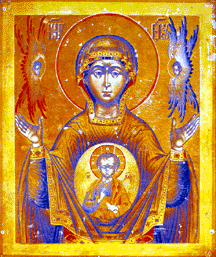This is a very digested version from chapter 18 in Helen Wessel's, The Joy of Natural Childbirth 5th edition, printed by Bookmates International, Inc., Santa Rosa Beach Florida, 1994. Helen prepared considerable research, and this paraphrase in no way gives credit or does justice to that research. I would encourage those of you interested in persuing Christian birth history to purchase your own copy.
The Bible clearly teaches that giving birth is a blessing to women. Although some women have pain in labor and birth for a variety of causes, there is nothing in either the Bible or the Jewish Talmud to indicate that such pain is either necessary or normal.
The so-called "curse of Eve", cannot be traced to the Scriptures or to early Judaism. It is first found in distorted Christian teachings of the third and fourth centuries A.D. Christian teachings promulgated that abstinence, even in marriage, was the way to salvation. A woman had to groan in labor to atone for her "sin" of marital sex. This teaching persisted for over a thousand years. When chloroform was discovered by Sir James Simpson in the early 19th century for use in cases of difficult childbirth, there was an outcry from the Christian church. This was construed as a blasphemous attempt to rebel against the curse that God had laid upon Eve. Even Queen Victoria in the late 19th century was criticized heavily for having used anesthesia, for having gone against the dictates of the "Christian" teachings with the birth of her 8th child.
Pain during child birth was actually a rare occurrence in our ancient ancestry. Pain and death was not associated with childbirth until the 16th and 17th century when people began to flock to the cities. Midwives, or wise women, were burned at the stake and falsely accused of witchcraft throughout Europe, especially if they administered any form of pain relief. They were admonished to make the women suffer. The masses of people no longer lived off of the blessings of the land, but used coin to trade for food, goods and services. The decline in health and sanitation until the 1940's, and the epidemics of child bed fever as women began delivering in the "houses of charity" (the precursor for the modern day hospital) created unhealthy conditions for our great great grandmothers to birth in.
The Bible does not degrade womanhood. It does not label child bearing as a curse. It is the interpretation of the words in the Bible that we must look at.
Genesis 3:16 is the passage commonly quoted by those who believe women have been "cursed to give birth in pain". That it is Eves punishment for having eaten of the tree of knowledge of good and evil.
The word translated as "sorrow" or "pain" is the Hebrew word estev. This word is also used when God curses Adam. This word is accurately translated as sorrow. Let's look at this Bible verse from the New Revised Standard Version. Genesis 3:16-17:
|
